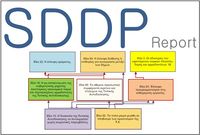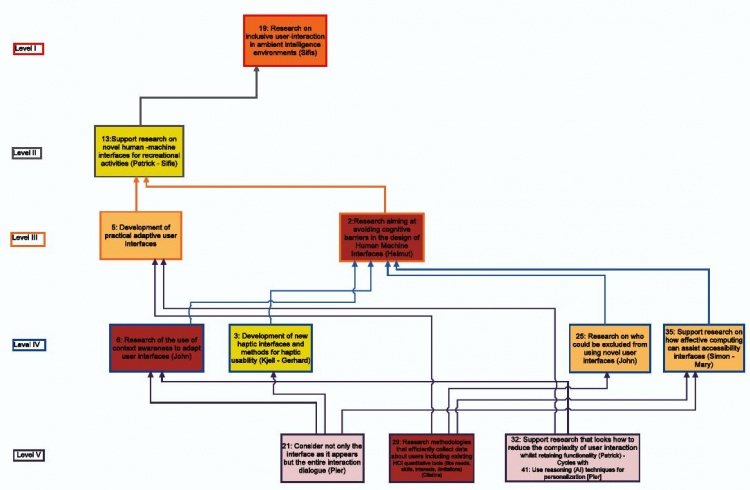SDDP CARDIAC II: Influence Tree for the Road-map on inclusive HCI research and development priorities for WP3: Difference between revisions
No edit summary |
No edit summary |
||
| Line 36: | Line 36: | ||
The workshop was facilitated by [[Yiannis Laouris]] ([[Cyprus Neuroscience and Technology Institute |CNTI]]), [[Georgina Siitta Achilleos]] and [[Tatjana Taraszow]] ([[Cyprus Neuroscience and Technology Institute |CNTI]]). | The participants had time to discuss and reflect on the influence map and in general agreed that the arrows in the map made sense to them. The structured dialogue process empowered the consortium team to identify the most influential research that is missing that could facilitate development of inclusive HCI and to assign to different members the role of carrying the discussions forward via the CARDIAC Wikispace and starting the analysis of how implement the various mechanisms. <br> | ||
In sum, the application of the SDDSM process supported the Consortium to identify potential mechanisms that ensure successful technology transfer in accessible and assistive ICT products and services. | |||
<br> <br> | |||
The workshop was facilitated by [[Yiannis Laouris]] ([[Cyprus Neuroscience and Technology Institute |CNTI]]), [[Georgina Siitta Achilleos]] and [[Tatjana Taraszow]] ([[Cyprus Neuroscience and Technology Institute |CNTI]]). It was attended by 22 participants from all over Europe. | |||
Revision as of 00:58, 4 October 2012
|
Executive Summary
This report has been developed in the context of the Cardiac project (FP7 - Coordinating Action: Grant Agreement 248582). The goal of the project is to create a platform that can bring together the various stakeholders in the area of accessible and assistive ICT with a view to identifying Research & Development gaps and emerging trends and generating a research agenda roadmap.
The Triggering Question (TQ) was
What type of research is missing that could facilitate development of inclusive HCI
In response to the TQ, the 22 participants came up with 75 characteristics, which were categorized in 18 clusters. Following the voting process, 50 ideas received one or more votes and were structured to create the influence MAP shown below.
According to the participants of this workshop, the characteristics appear to be the most influential were:
- Characteristic #21, Consider not only the interface as it appears but the entire interaction dialogue
- Characteristic #29, Research methodologies that efficiently collect data about users including existing HCI quantitative tools (like needs, skills,interests, limitations)
- Characteristic #32, Support research that looks how to reduce the complexity of user interaction whilst retaining functionality
- Characteristic #41, Use reasoning (AI) techniques for personalization
The participants had time to discuss and reflect on the influence map and in general agreed that the arrows in the map made sense to them. The structured dialogue process empowered the consortium team to identify the most influential research that is missing that could facilitate development of inclusive HCI and to assign to different members the role of carrying the discussions forward via the CARDIAC Wikispace and starting the analysis of how implement the various mechanisms.
In sum, the application of the SDDSM process supported the Consortium to identify potential mechanisms that ensure successful technology transfer in accessible and assistive ICT products and services.
The workshop was facilitated by Yiannis Laouris (CNTI), Georgina Siitta Achilleos and Tatjana Taraszow (CNTI). It was attended by 22 participants from all over Europe.

